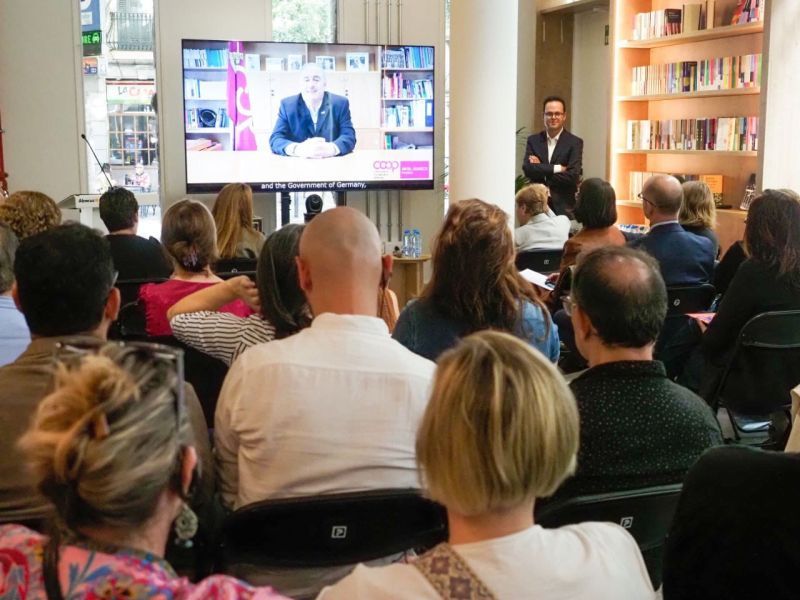BRUSSELS, October 16, 2025 – The International Cooperative Alliance [ ICA ], in collaboration with CICOPA, Abacus Cooperative, and the Arizmendiarrieta Social Economy Think Tank [ASETT], recently hosted a side event during the UNESCO World Conference on Cultural Policies and Sustainable Development [MONDIACULT 2025] in Barcelona, Spain.
Under the theme “Cooperatives in Culture for Diversity, Cultural Rights and Decent Work”, the event formed part of broader advocacy efforts to position cooperatives within global discussions and programmes that view culture as an integral element of sustainable development. It also aimed to support the work of the ICA Working Group on Cooperative Cultural Heritage and its representation in the post-2030 agenda.
Cooperatives as drivers of cultural diversity and sustainability
The first session explored cooperatives’ role in promoting cultural diversity and sustainability. Key speakers included:
- Maravillas Rojo, President, Abacus Cooperative
- Nadia Quevedo, Commissioner for Economic Promotion, Barcelona City Council
- Iñigo Albizuri Landazabal, ICA Board Member and Director of ASETT
- Ariel Guarco, President of the ICA [via video message]
- Simel Esim, Head of ILO Cooperative, Social and Solidarity Economy Unit; Chair of the UNTFSSE [online]
“The UNESCO inscription of the idea and practice of organising shared interests into cooperatives as an intangible cultural heritage of humanity in 2016 reminds us that our model is part of both history and the present,” said Guarco.
“We are demonstrating every single day that we are very concrete vehicles for protecting cultural heritage,” he added.
“Culture is an essential pillar of democracy,” said Rojo. “We believe culture reflects our humanity and diversity and can serve as a model for social transformation.”
Esim highlighted cooperatives’ contribution during crises, maintaining traditions in arts, crafts, food, and architecture, while promoting inclusive learning and community-based livelihoods.
“Cooperativism is a model that, over decades, has transformed our territory,” said Quevedo, who underscored the role of public policy in expanding the cooperative sector in Barcelona.
“From ASETT, we want to help existing cooperatives grow and support the creation of new ones. We believe that a society with more cooperatives is more democratic, more equal, and ultimately better,” stated Albizuri Landazabal.
Cooperatives as cultural actors for sustainable development
The second session focused on the role of cooperatives in achieving sustainable development through culture. Speakers included:
- Giuseppe Guerini, President, Cooperatives Europe
- Víctor Meseguer, Deputy Director-General, Abacus Cooperative
- Giovanna Barni, Counsellor for Innovation and Development, CoopCulture and President of CulTurMedia Lega Coop, Italy [online]
- Patxi Olabarria, President, High Council of Basque Cooperatives and Vice-President, UCOE [Spanish Cooperative Schools and High Schools]
- Liz McIvor, Manager, Cooperative Heritage Trust [UK] [online]
- Heloísa Lopes, Vice President, Sicredi Pioneria, Brazil [online]
- Marta Lozano, President, WazoCoop
Guerini illustrated cooperatives’ cultural role using examples such as Magnum Photos, the cooperative photography agency.
Olabarria emphasised the contribution of educational cooperatives to preserving Basque language and culture, noting their role in running schools and organising community activities.
McIvor warned that cooperatives must not become “a mausoleum to something from the past,” advocating for modern relevance:
“Through the international cooperative identity, our aim is to show how cooperativism promotes culture for development in today’s world.”
Barni described how cultural cooperatives in rural and southern Italy are engines of employment and economic resilience, particularly post-pandemic.
Lopes shared experiences from Brazil, where cooperatives foster social cohesion, territorial identity, and sustainability. She also highlighted Brazil’s national cooperative federation, OCB, which is contributing to the ICA global map of cooperative cultural heritage.
Lozano outlined WazoCoop’s work in the creative industries and social economy, empowering rural communities towards sustainability.
“Cooperatives are not just heritage. They are alive. We see it here today – at Casa Abacus, in the Basque Country, with ASETT, with Mondragon, and all the cooperators present,” said Meseguer.
Cooperatives and culture in the post-2030 Agenda
The final session, presented and moderated by Albizuri Landazabal, explored the integration of cooperatives into the post-2030 sustainable development agenda.
Speakers included:
- David Bonvehí, Director General for Social Economy and Cooperatives, Government of Catalonia
- Jokin Díaz, Director for Social Economy, Basque Government
- Osamu Nakano, Board Member, CICOPA; Vice Executive Director, Japan Workers Cooperative Union
- Santosh Kumar, Director of Legislation, ICA
- Iñigo Arbiol Oñate, UN Office for Local Development
Bonvehí commended Abacus Cooperative for reconnecting Catalans with their cultural heritage and announced plans to support a cooperative for musicians.
Díaz noted the Basque Country’s strategy to promote entrepreneurship, youth training, and international networking. He highlighted that the social economy in the region employs over 100,000 people and accounts for 10 percent of employment and 5 percent of GDP.
Nakano described Japan’s expanding cooperative culture across various sectors, viewing it as vital for sustainable, vibrant communities.
Arbiol Oñate stressed the importance of embedding cooperatives in territorial development policies to promote social cohesion and cultural diversity.
Kumar outlined the need for legal reforms to ensure a level playing field for cooperatives, stating:
“The cooperative identity is the sum of our collective experiences. These experiences must be identified, recognised, and celebrated. The law must not ignore or disadvantage cooperatives due to their unique nature.”
Conclusion and call to action
The event concluded with a call to action presented by Francesca Martinelli [Centro Studi Doc Foundation, ICA Rapporteur], outlining key recommendations for UNESCO MONDIACULT 2025.
Diana Dovgan, Secretary General of ICA Sectoral Organisation on Industry and Service Cooperatives, closed the event by thanking UNESCO for including it in the official programme, and Abacus Cooperative for hosting.
“The message from today is clear: cultural rights, diversity, and decent work belong together. Cooperatives embody this convergence. They show that workplace democracy fosters diversity, and that solidarity and democratic governance reinforce cultural freedom,” said Dovgan.
Source: ICA
Buy your copy of thecooperator magazine from one of our country-wide vending points or an e-copy on emag.thecooperator.news
